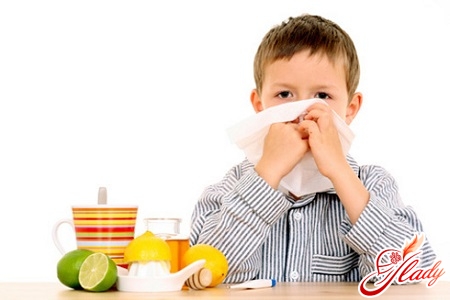
The ability of any organism to resistdifferent bacteria is called immunity. For any mother, it is very important that her child's immunity is very strong. Only strong immunity is able to withstand the attack of various bacteria and infections. Now there is a huge number of drugs and drugs that can enhance the immunity of not only an adult, but also a small child. But in addition to these drugs you need to monitor the conditions in which your child lives, for his nutrition and lifestyle. So, how to increase the immunity of a child? What factors need to be considered and what needs to be done? In general, there are several types of immunity. One type is the so-called specific immunity. Only after a person has recovered from any disease (rubella, chickenpox), this kind of immunity is produced. By the way, depending on the severity of the disease, immunity may persist for the rest of your life, or maybe for a certain period of time. Even while the child is in the womb, he forms the so-called nonspecific immunity, which is congenital. In addition to these types, immunology doctors share all types of immunity to natural (it is established only by the efforts of the organism in contact with the causative agent of the disease) and artificial, which appears after vaccination. There is also antimicrobial immunity. He fights against any pathogen and, as a result, destroys it. Antitoxic immunity resists to toxic products of vital activity and the decomposition of already dead pathogens.

Features of the immunity of the child
There are many reasons why immunityThe child may fall, and the child will be vulnerable to any disease. Among such reasons, you can identify malnutrition, lack of vitamins necessary for the body, stressful situations, poor living conditions, as well as various chronic diseases of internal organs. Immunity can be easily stimulated. For this, children's doctors strongly recommend that mothers from the early age temper their child. The procedure of hardening is very useful for children, it increases not only the immunity, but also the mood of the baby. Particular attention should be paid to the baby's nutrition. It must be balanced. The kid should receive all the necessary nutrients and vitamins. In the autumn-winter period, when the body is most vulnerable to all diseases, it is worth giving the child a variety of multivitamins and immunostimulating drugs. Immunity in a child, like an adult, has its own distinctive features. Thus, the child's organism is more vulnerable to all infectious and viral diseases than the adult organism. In the first months of a baby's life, all the vitamins necessary to him enter the body with mother's milk, in which there are so many immunoglobulins. That is why pediatricians advise to breast-feed at least up to 7-8 months. While the child is in the womb, the resistance of his body to various infections is promoted by class G immunoglobulin, which enters the body of a child with maternal blood. Immunoglobulin G accumulates in the body of the child for the duration of his stay in the womb. After the birth of a child, this immunoglobulin begins to be consumed. Suffices it for about 6 months. That is why, as a rule, children begin to get sick at the age of over six months. The body develops its own immunoglobulins of the child's body no earlier than 6 years, and by the end of the puberty period the immune system can be considered to be finally formed. Any child who visits kindergarten, and then school, faces various infectious diseases. In any educational institution, it is mandatory to vaccinate children for certain diseases. But it is nonspecific immunity that produces the body's ability to resist various forms of influenza, acute respiratory infections, bronchitis, tonsillitis, laryngitis, etc. 
Factors affecting the strength of the child's immunity
Often you have to deal with the situation,when one child can run all day in barefoot on puddles, and thus he will not be ill, and other child at the slightest breeze or dampness starts to hurt. This only indicates that in some children the strength of nonspecific immunity is much higher than in others. Of course, vaccination against certain diseases is a great thing. Thanks to it, children become immune to diseases such as measles, chickenpox, diphtheria, whooping cough, certain forms of hepatitis, etc. However, vaccination is in no way capable of increasing the nonspecific immunity of your child. After all, we are fully aware that the baby can have a full package of vaccinations, with every month sick with angina, bronchitis, otitis and other diseases. This is due only to the fact that such diseases are caused by microorganisms, vaccines from which do not. There are several main factors that in any way affect the nonspecific immunity of children. So, one of such factors are the living conditions of the child and the livability of his life. Low financial position of parents, too frequent change of residence - all this can affect the immunity of the child and reduce it. No less important role is played by the psychoemotional state of the child. It can be affected by an unfavorable atmosphere in the school, kindergarten or at home. Constant clarification of relations before children, frequent drinking of parents, resentment from peers - all this most directly affects the resistance of the body to all kinds of bacteria. Love of loved ones, caring and affection - this is exactly what any kid needs. 
A few more tips
Proper nutrition plays a huge role inmaintenance of healthy immunity. The daily diet of the child should include food containing all the necessary vitamins, useful elements and minerals. It is important to remember that nutrition must necessarily be balanced. Products of vegetable and animal origin should be included in it. Fruits and vegetables must be present in the daily diet. Some children are already born with some kind of disease, and someone acquires them in the early stages of life. If at least some organ of the child is affected by the disease, the immune system can no longer function properly and properly. Often, the immunity of the child is weakened due to such diseases as gastritis, pyelonephritis, intestinal dysbacteriosis, dyskinesia of the biliary tract, etc. If your child has a catarrhal disease for more than six times a year, and the diseases occur with some complications (tonsillitis, pneumonia) , we can conclude that its immunity is weakened and is not able to withstand infections and viruses. If you notice that your child is very often sick, first of all you should contact a doctor-immunologist or a pediatrician. To avoid complications and consequences, it is in no case to be engaged in treatment independently. 
Ways to improve immunity
As mentioned above, the main ways to supportthe immunity of the child is tempering, balanced nutrition, as well as the use of various drugs prescribed by the attending physician (immunostimulating). Hardening as a means of increasing immunity The procedure of hardening is recommended not earlier than from three years. But there are exceptions. If your child was born absolutely healthy, hardening can begin at least in the first year of his life. The process should be gradual. To begin with enough to rub the baby's body with a damp towel or sponge. You can also drench your baby's legs before going to sleep with cool water, while gradually lowering the temperature of the water (every day to a degree). Tempering a child of an older age should be presented in the form of a game to make it interesting. For example, you can conduct daily morning exercises as soon as your child wakes up. It is enough to perform various simple exercises within 10-15 minutes, which the child can easily repeat. The room where such exercises will be conducted should be well ventilated. After this, you can proceed to the next stage - grinding hands, feet and whole body with a wet sponge. The water temperature should be 22-25 degrees. Over time, it can be reduced to 18 degrees. After the procedure is completed, the child must be wiped dry and put on warm clothes. Balanced nutrition Every person, especially a child, needs to receive a certain amount of vitamins and minerals on a daily basis. All the important vitamins can be obtained by eating the right foods. So, vitamin A is found in sea fish, liver, carrot, milk, egg yolk, butter, cream, cabbage and greens. In addition to the fact that this vitamin is considered to be the best tool in fighting diseases, it also improves eyesight, nourishes the skin and perfectly helps with allergies. Vitamin A is able to speed up the reaction of your child's nervous system. You can get vitamin C by eating fresh and sauerkraut, citrus, dog rose, black currant, etc. Vitamin C can easily cope with colds. Its use in the early stages of the disease will not allow the transition of a cough and a cold to the chronic stage. Vitamin E is rich in spinach, lettuce, vegetable oil, whole wheat bread, broccoli, wheat germ, etc. This vitamin has a good antiviral effect. It is capable of destroying substances that poison the cells of your child's immune system. The necessary vitamins of group B are found in beets, legumes, buckwheat, green peas, cottage cheese, oatmeal, caviar, beef, tomatoes, etc. Vitamin B1 will restore the baby's nervous system, relieve it of constant moods, weakness and headache. And this, as we know, greatly affects the child's immunity. The lack of vitamin B2 significantly affects immunity. With its lack, diseases of the gastrointestinal tract may appear. Folic acid (vitamin B9 and B12) is involved in the formation of immune cells (lymphocytes). Vitamin D, which is also needed by the body, is found in sea fish and cow's milk or in fish oil, which can be purchased at any pharmacy. In addition to the fact that vitamin D is responsible for blood clotting and heart function, it also regulates the nervous and immune systems of the baby. To maintain strong immunity, the body needs potassium, magnesium, copper, zinc, selenium, iodine and other minerals. The potassium needed by the body is included in the radish, beans, cucumbers, raisins, baked potatoes, prunes. Magnesium is rich in walnuts, pumpkin, shrimp, soy, shellfish, greens and peas. In hazelnut, oats, buckwheat, sweet pepper, strawberries, tomatoes contain copper. In addition, walnuts, hazelnuts, wheat bran, sunflower seeds are rich in zinc. The iodine needed by the body can be obtained by eating seaweed, fish, seafood, mushrooms, onions, peas, etc. In the diet of any child, foods containing a sufficient amount of protein should be included. The protein is found in meat, beans, dairy products, peas, and beans. Multivitamin preparations for immunity Children's age is just the period when the body is growing rapidly. The internal organs and bones grow, the body is fully formed, and that is why the child needs much more vitamins than an adult. Children are more susceptible to avitaminosis than their parents. And this can lead to persistent immunodeficiency. Now in any pharmacy you can buy any necessary drugs that would help strengthen your child's immunity. The choice of multivitamins is now very large, and the producers can be both Russian and foreign. In the choice of the drug for a child is to consult with a specialist who will choose the most suitable for the baby vitamins. The baby's organism especially needs vitamins in spring and winter. After all, this is the period when the likelihood of getting sick is very high. This is because there are no sources of vitamins that were so available in summer and autumn. About natural fruits and vegetables for a while you have to forget, and in fact they are the sources of many elements necessary for the body. Immunostimulating drugs Nowadays, there are a huge number of drugs that can help strengthen immunity and improve the body's ability to resist various bacteria and viruses. The choice of such drugs is quite large. In any pharmacy you can offer such drugs as cycloferon, anaferon, interferon, echinacea, viferon, immunal, IRS-19 and many others. Interferon refers to bioactive substances. It is able to block the development of viral infections in the body and is considered an excellent means of preventing ARVI in children. Anaferon and tsikloferon refer to inducers. They contribute to the independent production of interferon by the body. Very often, doctors prescribe these drugs at the first symptoms of viral diseases, to facilitate the course of the disease and guarantee a speedy recovery. IRS-19, broncho-munal and imudan are related to bacterial preparations for increasing immunity. They contain very small doses of streptococcus, pneumococcus, staphylococcus and other pathogens of viral diseases. No danger to the body they do not provide, while they can significantly increase the immunity of the child. A good immunostimulating action is possessed by preparations of ginseng, echinacea, magnolia vine and others. The most important is their consumption in the autumn-winter period, when the organism is most vulnerable to infections. It is at this moment there are epidemics of influenza and ARVI.
Let's sum up the results
In addition to these drugs, there isset of others. In the choice of the drug must consult with your doctor. There is the possibility of increasing immunity with the help of folk remedies. Very useful are honey, lemon, cranberry, garlic, ginger, onion and other products. But not every child will like this method of treatment, so you need to take into account his age and preferences. For any mom, it is very important that her baby is always healthy. A good mood of the child is the main indicator of the baby's health. So, what should every mother know? First, she must clearly understand that immunotherapy is very important, and she should not in any case become an excuse for experiments on her own children. Trust experts who not only help cure your child, but also advise the right means to strengthen his immunity. Health to you and your children.








